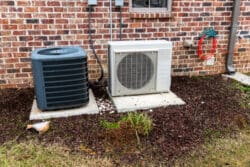
Florida homeowners face unique HVAC challenges—scorching summer heat, year-round humidity, and rising energy bills. Choosing the right system isn’t just about comfort; it’s essential for protecting your home, health, and wallet.
Whether you’re upgrading your system or installing one for a new build, this guide will help you navigate the best HVAC systems for Florida’s climate. From understanding SEER2 ratings to picking brands like Lennox or Bryant, we’ll break down your top options.
Why Florida’s Climate Demands Specific HVAC Solutions
Florida’s subtropical climate poses major challenges for HVAC systems. With average summer highs in the 90s and humidity levels often exceeding 70%, your cooling system works harder—and longer—than most parts of the country.
These conditions lead to extended run times, rapid wear on components, and significant energy consumption. High humidity also introduces the risk of mold growth and poor indoor air quality if not properly managed.
A system that performs well in other parts of the U.S. may not last or cool as efficiently in Florida. That’s why it’s crucial to choose a system designed to withstand the region’s demands, manage humidity effectively, and deliver consistent comfort all year long.
Key Factors When Choosing an HVAC System in Florida
Choosing the best HVAC system for Florida means looking beyond basic cooling capacity. From energy ratings to humidity control, every component plays a role in performance, efficiency, and long-term reliability in a tropical climate.
1) Energy Efficiency (SEER2, EER2, HSPF2)
Energy efficiency is one of the most important considerations for Florida homeowners.
- SEER2 (Seasonal Energy Efficiency Ratio 2) and EER2 (Energy Efficiency Ratio 2) ratings measure how efficiently your HVAC system cools your home.
- HSPF2 (Heating Seasonal Performance Factor 2) measures heating efficiency for heat pumps.
In Florida, a SEER2 rating of 15–16+ is highly recommended to keep utility bills in check during long cooling seasons. Higher ratings mean better performance with less energy waste—an essential factor when your AC runs nearly year-round.
Systems with variable-speed compressors and smart thermostats often deliver the best results in terms of comfort and efficiency.
2) Compressor – The Heart of the System
The compressor is responsible for pressurizing refrigerant and moving it between the indoor and outdoor units. Located in the outdoor condenser, it plays a vital role in heat transfer and overall system performance.
In Florida, a variable-speed or two-stage compressor can provide more precise temperature and humidity control while reducing energy consumption and noise levels.
3) Humidity Control
Humidity is as important as temperature when it comes to comfort in Florida. Without proper humidity control, your home can feel clammy even when it’s cool, making mold growth also a concern.
Look for HVAC systems with advanced dehumidification features, like variable-speed air handlers or two-stage compressors. These systems remove more moisture from the air without overcooling your home.
Effective humidity control also protects your indoor air quality and prevents issues like musty odors, warped wood, or sticky indoor environments.
4) System Sizing (Tons)
Proper sizing is critical. In Florida, oversized systems tend to short cycle, turning on and off rapidly. This leads to poor dehumidification and higher wear and tear. Undersized systems, on the other hand, run constantly without ever reaching the desired temperature.
An experienced HVAC professional will assess your home’s square footage, insulation, window exposure, and layout to determine the correct tonnage, ensuring balanced performance and efficiency.
5) Durability and Corrosion Resistance
Florida’s coastal air and humidity are tough on outdoor equipment. Salt in the air accelerates corrosion, which can shorten system lifespan if the unit isn’t properly protected.
Choose systems with coated coils, corrosion-resistant aluminum fins, and durable cabinets. Brands that emphasize coastal-grade builds will last longer and require fewer repairs over time.
6) Air Quality Features
High humidity increases the likelihood of mold, mildew, and airborne allergens. That’s why indoor air quality is a key factor for Florida homeowners.
Modern HVAC systems offer features like:
- High-efficiency filters (MERV 11–13)
- UV lights for mold and bacteria
- Built-in air purifiers
These additions improve overall air health, especially for households with allergies or respiratory conditions. Learn more about indoor air quality solutions from Gulf Shore Cooling, LLC, to take greater control over your home’s indoor air quality.

Top HVAC System Types for Florida Homes
Not all HVAC systems are created equal, especially in a state like Florida. The following system types offer the performance, humidity control, and efficiency required for long-term comfort in the Sunshine State.
Central Air Conditioners
Central air conditioners are the most common cooling systems in Florida homes. These split systems use an outdoor compressor and an indoor air handler or furnace coil to circulate cool air through ductwork.
Benefits include:
- Widespread availability and service support
- Consistent, whole-home cooling
- Easy compatibility with smart thermostats
However, if paired with an electric furnace for heating, they may not be the most energy-efficient option for Florida’s mild winters. Still, for homeowners focused primarily on cooling, central AC units remain a cost-effective and dependable solution and one of the most optimal routes to finding the best air conditioners in Florida.
Heat Pumps
Heat pumps provide both cooling and heating capabilities by transferring heat into or out of your home, depending on the season. In Florida—where winters are mild—this is among the most efficient choices and one of the best AC systems for Florida.
Advantages include:
- High SEER2 and HSPF2 ratings
- Superior dehumidification performance
- Year-round efficiency
Many systems use variable-speed technology to deliver precise comfort control and maximize moisture removal. While less effective in extremely cold climates, Florida rarely experiences temperatures below 40°F, making heat pumps ideal for most homes. Some units may use auxiliary heat strips for backup on rare chilly days.
If you’re replacing an older system, ask about Gulfshore Cooling’s AC installation services for upgrading to a modern heat pump.
Ductless Mini-Split Systems
Ductless mini-splits are ideal for homeowners who require zoned cooling or want to add HVAC to garage conversions, sunrooms, or additions without the need for ductwork.
These systems include:
- One outdoor compressor unit
- One or more indoor air-handling units
Benefits of ductless systems:
- Zoned control for personalized comfort
- Energy efficiency due to no duct losses
- Easy installation with minimal disruption
The main drawback? Higher upfront cost per zone and the visibility of indoor units. However, for targeted comfort and modern energy savings, they’re a top-tier option.
Geothermal Systems
Geothermal heat pumps use the stable temperatures underground to heat and cool your home. While installation is complex and expensive, the payoff includes:
- Extremely low operating costs
- Long system lifespan (up to 25 years)
- Quiet and consistent operation
Geothermal systems are best suited for new construction or homeowners willing to invest in long-term energy savings. Despite the higher upfront price, they offer unmatched efficiency and environmental benefits.
Recommended HVAC Brands for Florida
If you’re looking for a trusted HVAC brand built for Florida conditions, Bryant and Lennox are two of the best.
Bryant systems are known for their durability, energy efficiency, and advanced humidity control—ideal for coastal areas and long cooling seasons. Many models feature variable-speed compressors and SmartEvap™ technology for better moisture removal.
Lennox systems offer industry-leading SEER2 ratings, ENERGY STAR® certification, and whisper-quiet operation. Their high-end units feature allergen filtration and built-in smart technology for seamless home integration.
Each brand manufactures some of the best air conditioners for Florida’s demanding climate, backed by excellent warranties and Gulf Shore Cooling’s certified installation and service team.
Final Tips for Choosing the Right System
Choosing the best AC system for your Florida home comes down to efficiency, humidity control, and professional installation. Consult a licensed technician to assess your home’s layout, insulation, and square footage before making a decision.
Factor in long-term energy savings and warranty support, not just the upfront cost. The right system will reward you with lower bills, better comfort, and fewer breakdowns over time.
Why Regular HVAC Maintenance Matters in Florida
Even the best HVAC system won’t perform well without proper maintenance. This is especially prevalent in Florida, where units run hard for most of the year.
A professional AC tune-up typically includes:
- Coil cleaning
- Refrigerant level checks
- Blower motor inspection
- System performance testing
- Thermostat calibration
At Gulf Shore Cooling, LLC, our experienced team delivers comprehensive maintenance and diagnostics to help prevent surprise breakdowns, warm air issues, and rising energy bills. Routine tune-ups protect your investment and ensure peak performance before the summer heat peaks.
Contact Gulf Shore Cooling for Expert HVAC Installation and Repair
Whether you’re replacing an outdated AC system or planning a brand-new installation, Gulf Shore Cooling, LLC is here to help you choose and maintain the best HVAC system for Florida. Our team provides expert guidance, fast diagnostics, and tailored solutions that keep local homes cool, comfortable, and energy-efficient all year long.
From initial consultation to long-term system care, contact us for reliable AC installation, repair, and maintenance. We specialize in helping homeowners select the best AC system for Florida that stands up to the climate and the test of time.



